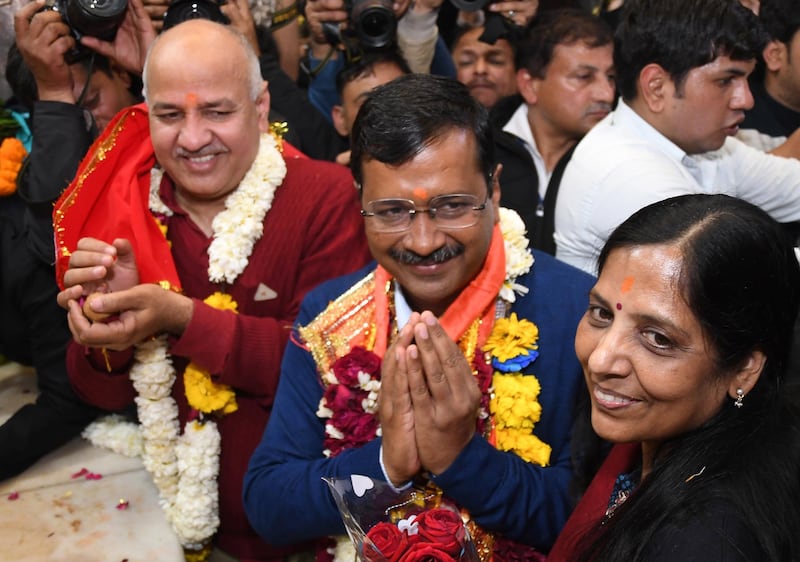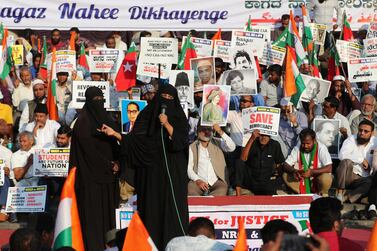Delhi's ruling Aam Admi Party inflicted defeat on Prime Minister Narendra Modi's Hindu nationalist Bharatiya Janata Party in a key electoral battle for the Indian capital.
Arvind Kejriwal's common man's party was poised to win 62 seats in the 70-member assembly as India's ruling party struggled to eight seats, five more than the last elections.
AAP comfortably crossed the majority mark of 36 seats to form a government third time in the city and was leading on 26 seats in the ongoing counting for the February 8 poll.
The upstart party had trounced Mr Modi's BJP in 2015 by winning 67 seats in the city assembly, a shock victory that political commentators credited to its grassroots appeal.
Thousands of AAP supporters celebrated the landslide victory at the party headquarters in Delhi that was decked up with blue and white balloons as scores of workers flashed brooms - AAP's symbol.
They chanted the party election tagline- "Lage Raho Kejriwal" or Keep It Up Kejriwal and danced to drum beats amidst plumes of smoke from celebratory fireworks. Mr Kejriwal visited a temple to pay his respects and meet his supporters.
BJP had launched an aggressive campaign to unseat the ruling party to control the city after 22 years.
Congress, the national party that ruled the state until 2013, failed to make any mark and conceded defeat in the early hours of the votes being counted.
“I thank Delhi voters from the bottom of my heart for this win and for trusting me for the third time,” Mr Kejriwal said in his victory speech outside the party office.
“People of Delhi have given birth to a new form of politics which is a politics of work and have sent a message only those who will build clinics, give 24-hour electricity, door-to-door water facility and build roads will be voted,” he said after blowing a kiss to the supporters.
Mr Modi conceded defeat in a tweet and hailed Mr Kejriwal for his victory.
The 51-year-old former tax officer turned politician won the posh New Delhi seat by a huge margin after the party making welfare schemes and free services as the main pitch of his election campaign.
The party focused on local issues including the heavily subsidised electricity, water healthcare and free public transport to women.
He has promised free bus rides to students, drinking water to homes, English classes to underprivileged students and sponsor pilgrimages for a million senior citizens.
Delhi is not a fully-fledged state and has a complex political structure, with the local government mostly looking after civic amenities, whereas key areas like policing and land come under the control of the federal government.
But controlling the city has a political significance for parties.
BJP's campaign blitz was led by Mr Modi's close aide Amit Shah and centred around Mr Modi's charisma and "Hindutva" - Hindu hegemony agenda, with a top leader calling the February 8 polling as a vote on India or Pakistan.
It sought to turn the polls into a referendum on the ongoing protests in Shaheen Bagh, where hundreds of women are blocking a key road since December 15 against a new citizenship law that grants non-Muslim nationals from three neighbouring countries citizenship.
BJP had defended the law, saying it was in the national interest and termed its opponents as “anti-nationals”.
Delhi-based political analyst Zoya Hassan said Mr Kejriwal’s victory was a strong message to the BJP that people choose “inclusive development over narrow nationalism.”
"It sends out signals that the politics of polarisation and Hindu-Muslim division doesn't work when it is pitted against very concrete development and welfare measures," Ms Hassan told The National.
She said that the Hindu Nationalist party tried to turn the contentious law into a test of patriotism for the electorate.
"That binary has been rejected by the people and it is a reaffirmation of inclusive politics and inclusive citizenship,” she added.
More than 300 leaders, including Mr Modi and Mr Shah, campaigned for the party, in an often vitriolic election campaign, urging voters to ousted the ruling party for its “anti-national” stance.
Gurpreet Mahajan, a political science professor said that the voters had prioritised daily life and local issues over BJP’s nationalism rhetoric.
"National elections are little different but state elections are an assessment of ongoing work," Mr Mahajan told The National.
The defeat is seen as a major setback to the BJP that has lost two major states after the thumping victory in the national elections in May 2019.
BJP is warming up from state election in eastern Bihar and West Bengal, where regional parties will throw a strong challenge.
“It is a message for the BJP that because Modi is so popular that BJP nationalises state elections and this nationalisation of state elections doesn't work because the logic of state elections is often very state specific,” Hassan said.
Mr Kejriwal’s rise to power was a direct result of a massive street agitation against corruption and political reforms in 2013. He formed a political party along with lawyers, journalists and activists and in his electoral debut won 28 seats but failed to continue in chief minister’s chair after losing the floor test within two months.
They swept the polls in 2015 but have failed to make gains in other states dominated by regional and national parties.






